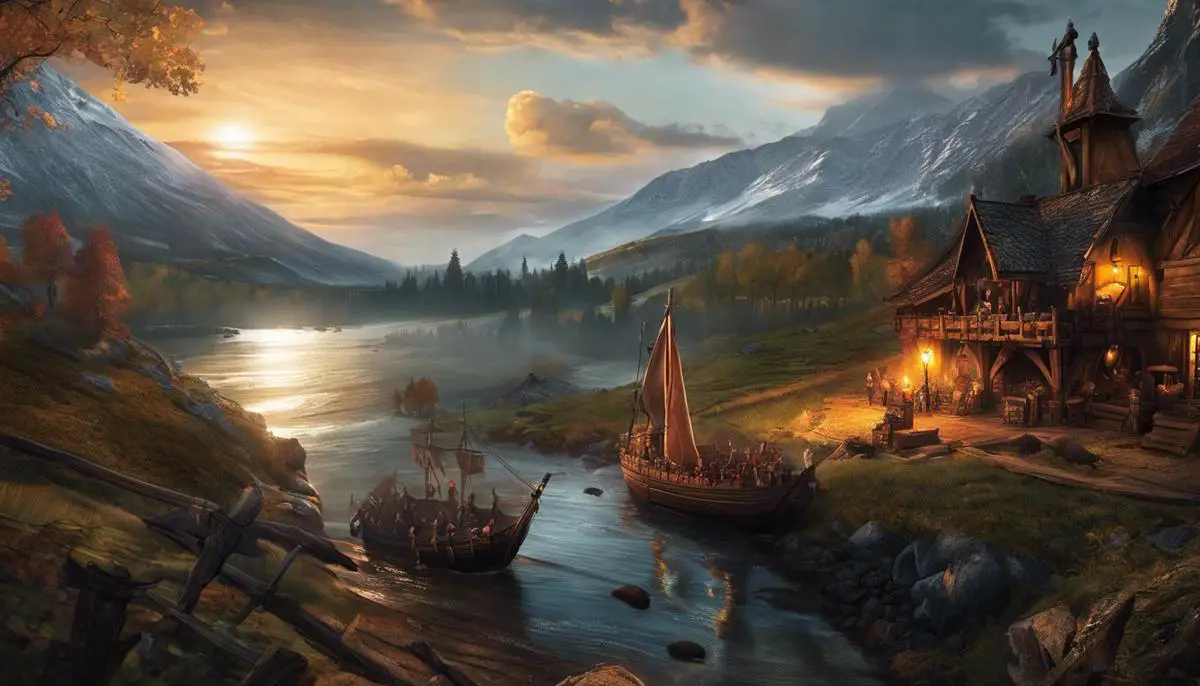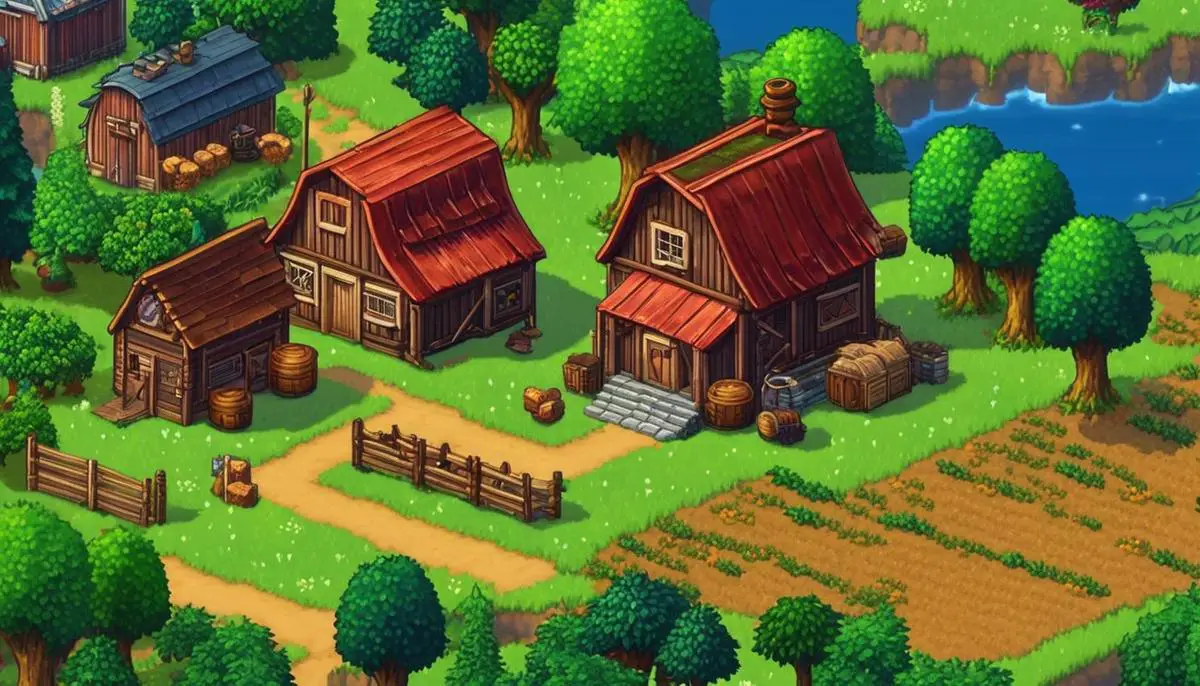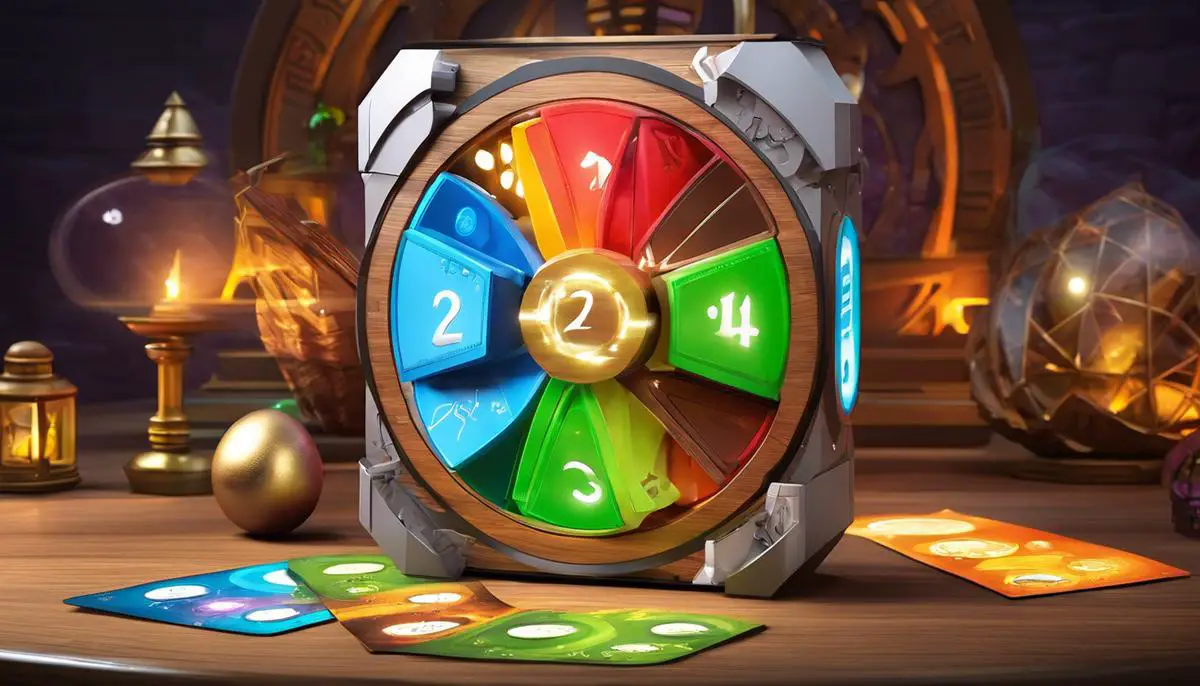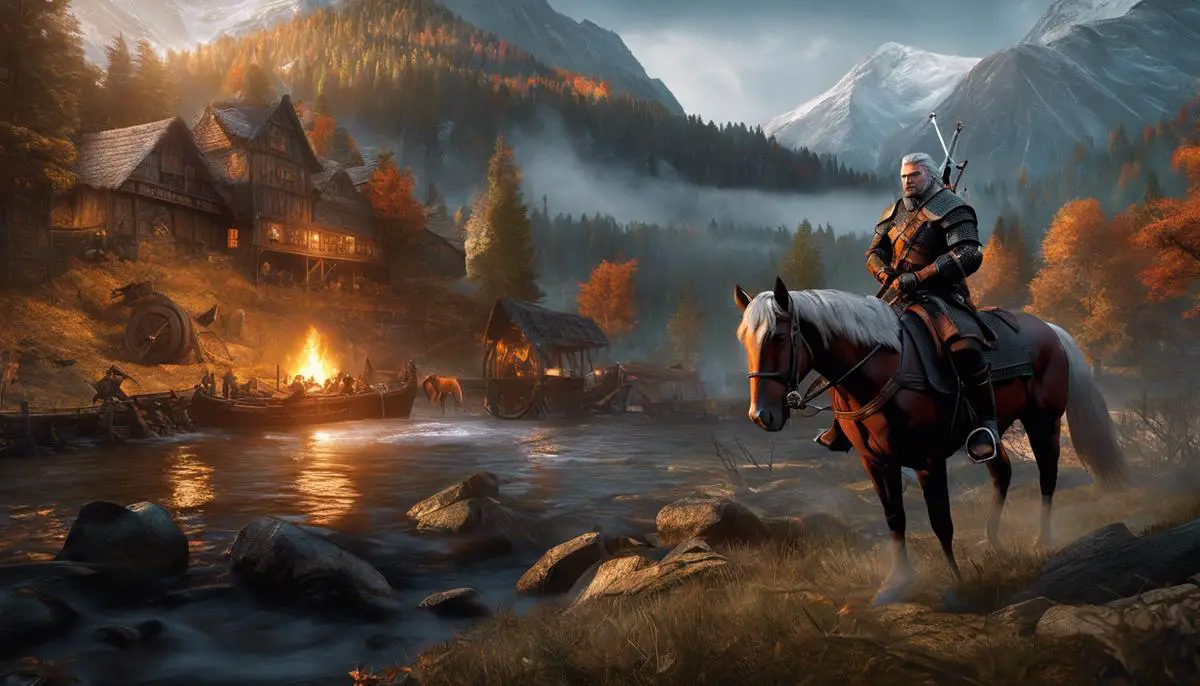Imagine the lush landscapes of The Continent, the bountiful fields of Pelican Town, and the enigmatic labs of Aperture Science coming to life on your dining room table. The world of video games offers a vast treasure trove of narratives, characters, and mechanics that have the potential to transcend the screen and captivate imaginations through the tactile and social experience of board games. Board game enthusiasts and video game fans alike stand on the precipice of an exciting frontier, one where the beloved virtual adventures from The Witcher series, Stardew Valley, and the Portal series can be reimagined as engaging board games. These iconic titles offer rich canvases for the creation of strategic, cooperative, and puzzle-based tabletop games, inviting players to step away from their screens and gather around the table for a shared journey through worlds they have come to love.
The Witcher Series
Unleash Your Strategic Mind: The Witcher’s World as a Board Game Extravaganza
Eager to dive into a world where quick decisions and strategic plays lead to victory? For fans of Geralt’s monster-hunting escapades, translating his thrilling adventures into a board game experience isn’t just possible, it’s a potion for pure entertainment. Here’s a look at how the Witcher universe can morph into an intricate, strategy-laden board game that’ll hook players from the get-go.
Picture a game brimming with risk and reward. Players could assume the roles of different Witchers, each crafted with unique abilities – because let’s face it, who doesn’t cherish the thought of wielding Geralt’s sword with a flick of the wrist or gracing the board game battlefield with Yennefer’s magical prowess? The key is tailoring characters to fit every player’s style, whether they like to jump head-on into battle or prefer concocting strategies with wit sharper than a silver blade.
The map – oh, the glorious map! – would be a sprawling canvas, a miniature replica of the Continent complete with treacherous mountains, murky swamps, and bustling cities. Each region would bring its own set of challenges and monsters to conquer or outwit because, in a world teeming with griffins and leshens, no two quests are ever the same.
Resource management would be as crucial as a trusty steed. Players would gather ingredients for potions, hunt for precious artifacts, and trade with merchants to gain an edge. The game would encourage collaboration but never forget – in the end, only the most cunning Witcher claims glory.
Moral choices and consequences would inject a dynamic twist. Align with a faction, influence the fate of the realms, or remain a lone wolf to shape the narrative. Feast your competitive soul – each choice spins the web of intrigue and impact, just like in Geralt’s world.
Combating enemies and securing alliances could revolve around a card-based mechanic. Consider the rush of drawing the perfect card for battle or the tense moments when a poor hand requires all your guile to overcome. Cards could range from swordplay maneuvers to magical signs, giving battles an unpredictable edge that reflects the ever-changing tides of combat our Witcher knows all too well.
Mini-games within the main game could represent Witcher Trials, because who doesn’t want their mettle tested in the Trial of the Grasses? Each Trial would be a game within the game, a chance to sharpen skills and prove oneself.
Innovation is key. Board game aficionados crave experiences that push the envelope, and a Witcher game could offer mechanics like time-based events, where seasons change and affect the gameplay. Winter isn’t just coming; it’s changing everything from resource availability to monster behavior.
If there’s one certainty, it’s that player interaction magnifies the game’s intensity. Forge allegiances, negotiate, betray – the path you choose could set in motion a chain of events that defines your journey. Will you uphold honor like Geralt, or are you playing a deeper game?
Finally, completionist milestones to please even the most avid collectors – quests that unlock limited edition figures or cards, adding tangible rewards to your board game victories, just as Geralt collects trophies from his defeated foes.
Unleashing Geralt’s universe into the realm of board games isn’t merely a transition – it’s a metamorphosis into a strategic realm where every move counts, every decision is heavy with consequence, and every game session an untold tale from the Witcher lore. Prepare to step into a realm where the line between board game and adventure blurs. Keep your swords sharp and your wits about you – the game awaits.

Stardew Valley
Embarking on a Farm-to-Tabletop Journey with Stardew Valley
Roll up your sleeves and break out the board because the heartwarming world of Stardew Valley is ripe for the tabletop transformation. It’s a venture where green thumbs and strategic minds converge in a bid to harness the charm of pixelated crops and country life within the tangible realm of dice rolls and card exchanges.
Nestled in the cozy confines of a tabletop setup, the essence of Stardew Valley’s serene complexity is not only capturable, it’s set to blossom. Here’s how:
- Seasonal Shuffle – Each player’s farm goes through the four seasons, rendering different challenges and crops. The game board itself could feature modular pieces that represent spring’s renewal, summer’s bounty, fall’s harvest, and winter’s rest, offering an ever-changing tableau that keeps players thoroughly engaged.
- Community Center Chronicles – Just like the game, players must work to restore their own version of a community center. Completing bundles by gathering specific items or crops would unlock rewards and even impact the game’s trajectory on a broader scale – fostering a sense of accomplishment and fostering a collaborative atmosphere.
- Livelihood Link – Crafting a livelihood doesn’t have to stay digital. A tabletop version could implement a system where players balance the time spent between tending to their farm, socializing with NPC characters, and exploring the mysteries of the local mine, adding depth to the dynamics of rural life.
- Fortune & Festivals – From the whimsy of the Flower Dance to the fierce competition of the Egg Festival, incorporating event cards that simulate the town’s seasonal festivals would offer players delightful breaks from the routine and inject a festive spirit into gameplay.
- JojaMart Dilemma – In a twist of moral quandaries, players could face the decision to support the community or align with the corporates. This introduces an intriguing element of choice, potentially dividing loyalties and sparking rich player interaction.
- Narrative Threads – Deepening the experience with story cards could allow players to unfold personal narratives, unravel secrets, and foster relationships with other characters, just as in Stardew Valley’s rich storyline. This immersion could be amplified through quests and random events that mimic the spontaneous nature of the game.
As entrepreneurs know, understanding your audience is key, and there’s a dedicated crowd eager for more Stardew Valley. A tabletop incarnation must weave together the game’s tranquil complexity with the hands-on joy of a board game – creating an inviting blend of strategic farming, resource management, and storyline elements that make Stardew Valley such a treasured digital escape.
To translate Stardew Valley into a farming-themed tabletop game, one must not only capture the spirit of the game but also invent fresh ways to evoke the same satisfaction that comes from a well-tended farm and flourishing community. It’s a quest that, much like farming itself, requires patience, creativity, and a touch of seasonal magic. Whether navigating the waters of Riverland Farm or the mysteries beneath the Stardew Valley mines, the board game adaptation must blossom into an experience that stands tall on its own while honoring its digital roots.
With ingenuity at the helm, the table is set; let the farming begin.

Portal Series
Ingenious Mechanics for a Portal Themed Board Game That’ll Warp Your Mind
Ever thought about how a Portal-themed board game could warp reality right on your kitchen table? Buckle up, Portal fans—the dream of a physical Portal board game isn’t as far-fetched as you might think. Fresh twists on beloved mechanics could transform head-scratching puzzles into a tangible, tabletop experience. Imagine peering into the tabletop abyss and seeing a game as enthralling as GLaDOS’s deadliest tests. Let’s dive into what game-changing mechanics could truly bring the essence of Portal’s puzzling universe to the board game realm.
First off, we’re talking dynamic board layouts. Picture this: modular tiles that can be rotated or flipped to change the landscape of the Aperture Science facility with each game. It’s like a maze that shapeshifts at your every move, daring players to forge new paths and throw their competitors for a loop—literally.
Next up, let’s introduce teleportation tokens. These aren’t your garden-variety placeholder pawns; teleportation tokens double as mini portals, opening up spatial rifts on the board. Place one down and bam—your character figurine leaps across the board as if it’s just passed through a test chamber’s ceiling.
But what’s a Portal game without mind-bending physics? We need a magnetic cube mechanism—fancy words for a cube that can ‘defy gravity’ and latch onto the game board. Elevate gameplay with tricks and traps that mirror the weighted companion cube antics we all attempted (and sometimes failed) in the digital game.
Then there are the puzzle sequence cards—think of these as your test chamber to-do list. These cards will dictate how you tackle each section, adding layers of strategy to the game. The cards come with a side effect: they force collaboration with adversaries, teasing out those nuanced bouts of teamwork sprinkled throughout Portal’s narrative.
And because every test subject needs some encouragement, let’s introduce achievements and rewards. Players can earn cake (decoration, of course), or unlockable miniatures that enhance their scientific journey. Each reward feels like a steely pat on the back from GLaDOS herself.
Now, what about integrating a timer to heighten urgency? As the test chamber’s clock ticks down, the pressure mounts. Solve that puzzle before time bombs players back to the starting tile, a delightful way to keep adrenaline levels as high as Wheatley’s ambitions.
Last but not least, the game wouldn’t be complete without nods to humor and easter eggs—those moments where the game winks at its players. Echo the game’s dry wit with cards or events that spark laughter, capture the charm of Portal’s dialogue, or throw a curveball at the seasoned test subjects.
Wrap it all up, and you have a board game that’s part cunning strategy, part collective sighs of relief, and full Portal pandemonium. Playtesters, get your thinking caps on and prepare for science—board game style. Remember, the cake might be a lie, but the fun you’ll have bringing these puzzles into the real world is as genuine as GLaDOS’s love for testing.

The seamless melding of video game worlds into the realm of board gaming holds vast potential for unforgettable gaming experiences. Through skillful design and a deep understanding of what makes each title resonate with its audience, these board games can offer a new way to interact with treasured universes. By drawing on the strengths of The Witcher series, Stardew Valley, and the Portal series, creators can craft experiences that are not only true to the original vision but also add a unique dimension that is only possible in the world of tabletop games. Whether you’re a fan of strategic depth, rich storytelling, or mind-bending puzzles, the translation of these video games into board games could open the door to a whole new form of immersion and engagement for hobbyists and enthusiasts alike, fostering communities and shared memories around the flicker of candlelight on game night.
